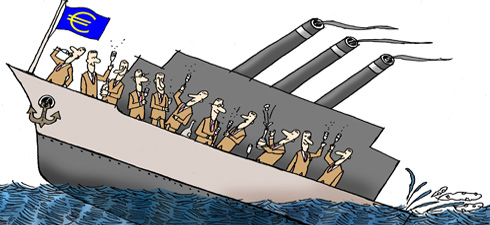Leaving aside the short-sightedness of our political leaders, one of the most depressing aspects of the recent disasters in Europe is the indifference of citizens towards events. Naturally, they worry about the social and economic setbacks that could affect them, but there are no signs that Europe is, for Europeans, anything more than a currency that has entered the danger zone.
Hence, while some people are wondering what the collapse of the euro would mean, nobody seems bothered about the consequences that the end of the European dream will have on our civilisation – the true catastrophe that, if no remedy is forthcoming, we are facing.
The sinking ship syndrome is already dominating European politics and, driven by fear, the fiercer types of nationalism are returning. The closer to the gutter the journalism echoing the discontent, the greater the accusations. The worst is that citizens, by contagion or on their own initiative, have started hurling condemnations at each other.
The ultimate cause of the current drift is the very poverty of the spiritual perspective that has enveloped the construction of Europe in the second half of the twentieth century. True, the process chalked up some fine successes, such as the dismantling of borders and the acceptance of a common currency, but the courage and creativity needed to draft a truly stirring scenario was always missing.
An entrenched bureaucracy
If from an economic perspective Europe did come by a new prosperity after the Second World War, culturally it continued to be a defeated power that had lost its former hegemony. Max Ernst painted beautifully well the European defeat in Europe “après le déluge”. Over the years, Europe has recovered materially but not spiritually, such that the shattered landscape painted by Ernst has taken on a new symbolism in the half century of the Cold War and domination by America, a period in which Europeans were submerged in a gradual ceding of their cultural ground that has seen them lose almost all signs of their identities.
The construction of Europe has appealed more to the wallet than to the conscience. It is true that in the first years there were still first-class statesmen about. When these began to dwindle in number, the fragility of the civilising impetus in the European project became evident. Advances in communication and trade did not mean a decisive strengthening of the future idea of Europe: Europeans began to travel from one end of the continent to the other, and students even began to transfer among the most widely distant universities.
Paradoxically, though, this dynamism did not provide the the foundations for a solid architecture that could house a sentiment of unity. In America or Asia we were called Europeans, but here we have failed to feel like Europeans, despite the mammoth displays of Europeanness put on by the institutions in Brussels and Strasbourg. Our past was a common one. Nonetheless, our present is hazy and our future uncertain.
The challenge that revealed that failure was the adoption of the European Constitution, a document that was intended to ratify a renascent Europe – after the Roman and Carolingian empires – and that, in practice, was the umpteenth expression of an entrenched bureaucracy that inspired no enthusiasm whatsoever among Europeans. The European Constitution proved to be a sterile text that to some degree did recover the spiritual and moral heritage of the continent but that had no chance of inspiring any active support from the citizenry.
Freedom as the rule
And yet the collapse of the European project would be the worst thing that could happen to the world, at least where freedom is concerned. Europe still has time to explain why, and above all to explain why to itself. As a European citizen I would have liked the Magna Carta of Europe to have recognised, in a radical exercise in self-criticism, our colonialist and exploitative past. Likewise, it was also a good moment to remind the world of the enlightened and humanistic contributions - genuinely European ones - to individual freedom and collective democracy.
It was a good moment, and it still is a good moment. Amid the turmoil of what is called the "universal crisis", the only possible way forward for Europe is to dislodge the omnipresent market from its central position and return the centre of gravity to democracy. In this operation, which is mainly a cultural one, Europe could still be strong and recover some of its vanished pride.
In contrast, the definitive dissolution of the European project would leave the road open to totalitarian options that are enjoying unexpected prestige, for historical reasons, as effective antidotes to the crisis. For Putin, for the Chinese Communist Party and Arab sheikhs, freedom is a nuisance to be endured for the health of the markets.
And this is precisely not what Europe should be gambling on if it wants to be true to the best of itself. As the historic homeland of democracy, its vitality depends on its willingness to put forward freedom as the rule that must always trump the other rules of the game, especially the laws that seek to impose the great Moloch of speculation on all the citizens of the world – including, of course, on the sleepy, faint-hearted and selfish citizens of Europe.
Was this article useful? If so we are delighted!
It is freely available because we believe that the right to free and independent information is essential for democracy. But this right is not guaranteed forever, and independence comes at a cost. We need your support in order to continue publishing independent, multilingual news for all Europeans.
Discover our subscription offers and their exclusive benefits and become a member of our community now!












